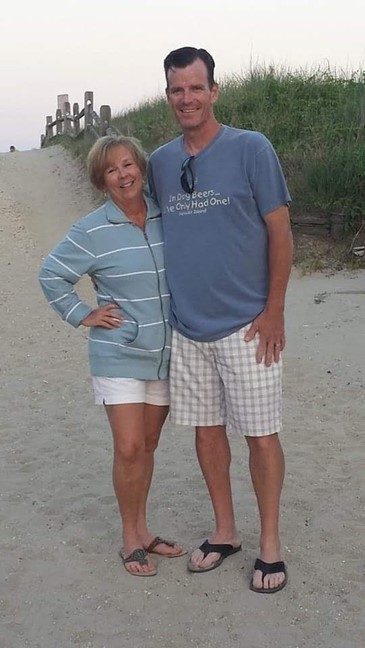Our Story – Dave and Kathy Rogers
No one expects their life to be turned upside-down by a dementia diagnosis, but that is exactly what happened to us. At the tender age of 49, my husband Dave, who is my partner in all things and the father of three, was diagnosed with Primary Progressive Aphasia. Dave worked construction and was the hardest working man I ever knew. Building on his reputation of honesty, quality and commitment, Dave developed a commercial construction company from the ground up. Together we had almost finished putting three kids through college and were looking forward to being empty nesters with time to slow down and relax and build towards retirement. My job as the Executive Director of Absolute Companion Care, an elder care company was something I loved. All our plans shattered into a million pieces on Christmas Eve 2015. Together we continue to put some pieces back together, throw some pieces out and yes, a few have cut us along the way.

The language issues started back in 2013. Word finding was becoming more difficult. Telephone conversations at work required his office manager, our eldest daughter, to listen and take notes. He stopped writing his own emails and started to dictate them instead. Stress, we thought, was the culprit. It continued even after changing work habits to allow for more time to rest and using better organizational skills to stay focused. A trip to the doctor left us with an Attention Deficit Disorder diagnosis and Adderall. For a while, it seemed to help. Our daughter came home with “funny Dad stories” about words that came out wrong or things said backwards. Dave laughed at himself and some days it looked like it was getting better. But dementia is progressive and what we thought was a solution was only a mask.
By 2015 we knew there was more going on. He was really struggling with words. It had progressed from nouns to verbs, adverbs, and adjectives. We noticed more lethologica; describing words he could not remember. CAT scans revealed nothing physically wrong with the brain, so the next logical step was a neurologist. On Christmas Eve 2015, after 45 minutes of testing in a neurologist’s office, we first heard the words Primary Progressive Aphasia. Confirmed six month later by Dr. Hillis at Johns Hopkins, I turned my focus to find out all I could about this disease. Conversely, Dave wanted to know nothing about the disease or its progression. He wanted to face each day thankful for what he still had and not worried about what he was going to lose.
Dave suffers from the Logopenic sub-group of Primary Progressive Aphasia. His speech was becoming noticeably slower and hesitant. He was still very good with “small talk,” so it was easier for him to hide it by steering clear of heavier conversation topics. The kids and I saw his struggles and frustrations. He closed his business and began doing home improvement jobs for friends and family. Dave no longer had the executive functioning skills needed to coordinate commercial jobs. Thankfully, he had not lost his love of working with tools, a skill set he used to stay busy. He wanted to contribute monetarily for as long as possible. He knew going from two incomes to one at our age was going to be a burden and Dave wanted no part of being a burden to anyone.
Dave faced life’s challenges with the thinking process of a builder. His first goal was to construct a plan, then to figure out a way to make this journey beneficial to others. Consequently, his first course of action was to volunteer for Alzheimer’s studies at Hopkins and at Northwestern University Hospital. Patiently, he underwent numerous MRI scans, PET scans, a lumbar puncture to donate brain fluid, and more hours of neurological testing than I could count. In 2018 he signed the forms required to donate his brain to Alzheimer’s research. Logopenic PPA is caused by Alzheimer’s disease which is what causes Alzheimer’s dementia as well as several other types of dementia. His affected brain area is the left parietal lobe where the language hub resides. He continues to lose language abilities and comprehension skills; nonetheless Dave has not lost his sense of humor or his dedication to finding a cure.
The studies helped both of us connect to others going through similar life changes. Dave made friends everywhere we went. In Chicago, he not only contributed to the studies, but he also sat and talked to anyone who would listen, telling them how it felt to be inside his brain. More than anything, Dave wanted to be a contributor to the world and not an observer. In Chicago, the lumbar puncture was performed during a trip we planned to coincide with my daughter’s 30th birthday. The puncture created a massive migraine and we ended up in the hospital. He was in terrible pain and he missed the birthday dinner we had flown our family in to celebrate. In spite of this setback, when the hospital called to say the fluid had been inadvertently compromised, Dave immediately volunteered to have it done again.
As the years have progressed, so has the dementia. As a result of my business, I was more prepared than most for the continuous decline. Still, I was not emotionally ready. I do not believe anyone is ever prepared for the continual loss. I counseled my clients and their families on the best ways to avoid the pitfalls of dementia yet was not always able to do that myself. We became involved with the Alzheimer’s Association and met Deb Hanna and so many other wonderful people. We came to a support group meeting when Dave was first diagnosed, but he was not ready to see those worse off than him. His dementia diagnosis was something Dave did not want to face yet. A few years later, we reconnected and the folks we have met have become our life support. I have been able to give them concrete ideas about dementia care, hiring caregivers, even hospice choices. They have given us so much more, including the unconditional acceptance into a group where no one wants to belong.
Dave continues to be a fixer. He continues to offer help where he can and stays as connected as possible to people. Our friends and family still rely on Dave for all the tasks that most homeowners dislike. Dave remains adamant that he can help, and he does. We have both learned so much on this journey. Dave insisted from the beginning that he did not want this disease to change the trajectory of his children’s lives nor did he want to stop being a productive, contributing member of our family. He continues to be both of those things, albeit slower, and with no less conviction that he can and no less pride when he has met a challenge. Dave has begun to use the Touch Talk device, an assisted speech computer. He knows his physical and cognitive abilities have diminished. However, Dave does not feel less of a person because he knows every day that we still need him.

